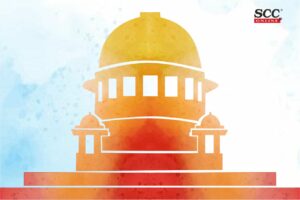Supreme Court: The 3-judge bench of SA Bobde, CJ and AS Bopanna and V, Ramasubramanian, JJ has refused to interfere with the scheme of sale of electoral bonds by the Political Parties challenged on the ground that it allows the donors of political parties to maintain anonymity which is not healthy for a democracy. The Court said that even though the Scheme provides anonymity, it is intended to ensure that everything happens only through banking channels and that,
“All that is required is a little more effort to cull out such information from both sides (purchaser of bond and political party) and do some “match the following”. Therefore, it is not as though the operations under the Scheme are behind iron curtains incapable of being pierced.”
The following prayers were made before the Court:
(i) A declaration that all national and regional political parties are public authorities under the Right to Information Act, 2005;
(ii) A direction to the Election Commission of India to collect all information concerning the finances of political parties;
(iii) A direction to all national and regional political parties to mandatorily disclose complete details about their income, expenditure, donations and funding as well as full details of the donors.
Analysis
Explaining the Scheme, the Court said that while the identity of the purchaser of the bond is withheld, it is ensured that unidentified/ unidentifiable persons cannot purchase the bonds and give it to the political parties.
Under clause 7 of the Electoral Bonds Scheme, 2018, buyers have to apply in the prescribed form, either physically or online disclosing the particulars specified therein. Though the information furnished by the buyer shall be treated confidential by the authorised bank and shall not be disclosed to any authority for any purposes, it is subject to one exception namely when demanded by a competent court or upon registration of criminal case by any law enforcement agency. A non-KYC compliant application or an application not meeting the requirements of the scheme shall be rejected.
“If the purchase of the bonds as well as their encashment could happen only through banking channels and if purchase of bonds are allowed only to customers who fulfill KYC norms, the information about the purchaser will certainly be available with the SBI which alone is authorised to issue and encash the bonds as per the Scheme.”
Moreover, any expenditure incurred by anyone in purchasing the bonds through banking channels, will have to be accounted as an expenditure in his books of accounts. The trial balance, cash flow statement, profit and loss account and balance sheet of companies which purchase Electoral Bonds will have to necessarily reflect the amount spent by way of expenditure in the purchase of Electoral Bonds.
Further, the financial statements of companies registered under the Companies Act, 2013 which are filed with the Registrar of Companies, are accessible online on the website of the Ministry of Corporate Affairs for anyone. They can also be obtained in physical form from the Registrar of Companies upon payment of prescribed fee. Since the Scheme mandates political parties to file audited statement of accounts and also since the Companies Act requires financial statements of registered companies to be filed with the Registrar of Companies, the purchase as well as encashment of the bonds, happening only through banking channels, is always reflected in documents that eventually come to the public domain.
The apprehension that foreign corporate houses may buy the bonds and attempt to influence the electoral process in the country was also found to be “misconceived”. Under Clause 3 of the Scheme, the Bonds may be purchased only by a person, who is a citizen of India or incorporated or established in India.
The Court, hence, found no reason to interfere with the Scheme.
[Association for Democratic Reforms v. Union of India, 2021 SCC OnLine SC 266, decided on 26.03.2021]
Appearances before the Court by:
For appellant: Advocate Prashant Bhushan,
For Union of India: Attorney General KK Venugopal
For ECI: Senior Advocate Rakesh Dwivedi

